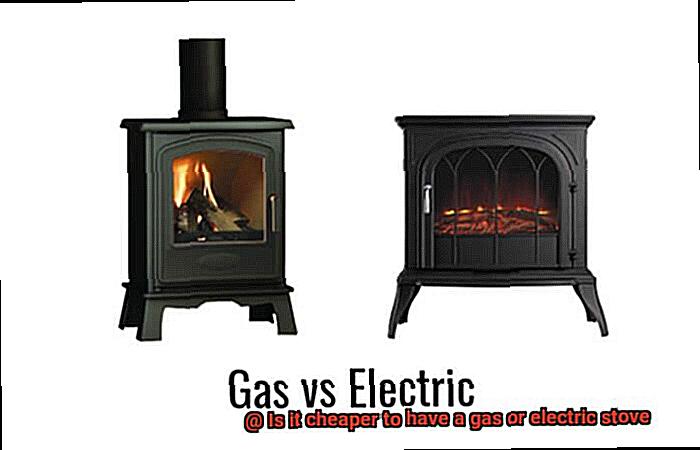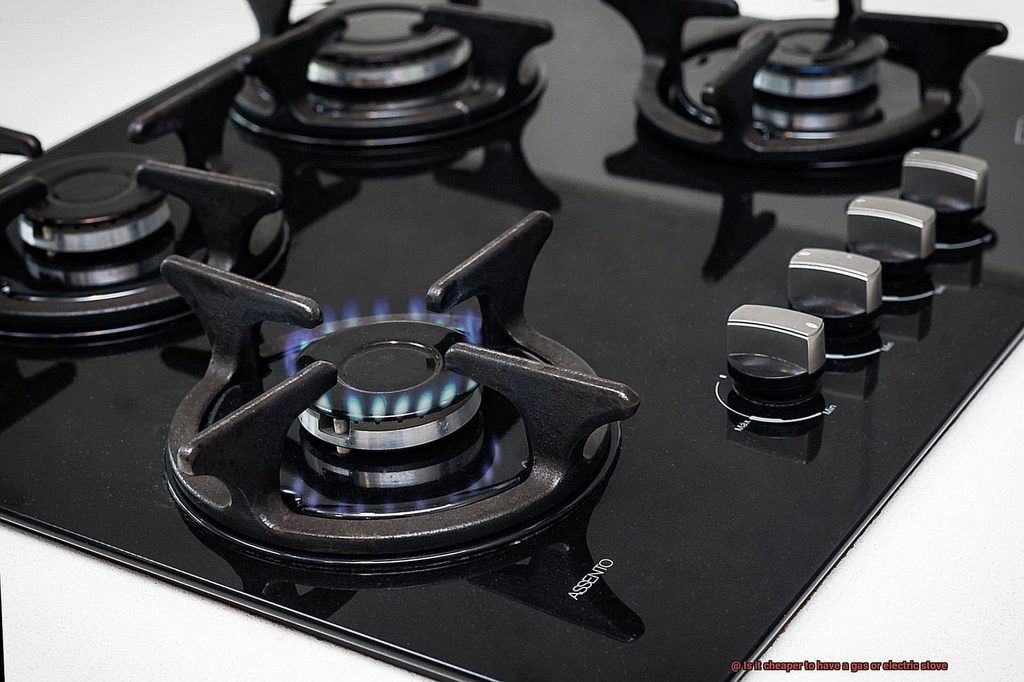Are you tired of getting hit with high energy bills every month? Have you been pondering whether a gas or electric stove is more cost-effective? Well, stop wondering and start reading. In this blog post, we’re diving deep into the costs associated with both types of stoves to help you make an informed choice.
It’s no secret that cooking on a stove can be an energy hog, leading to costly bills. According to the U.S. Energy Information Administration, the average American household spends about $110 per month on electricity alone. But how much of that goes towards using an electric stove? And does switching to gas make a dent in your wallet?
We’ve done the research so you don’t have to. We’ll examine everything from the initial purchase price of each stove to their energy efficiency and long-term savings.
By the time you finish reading this post, you’ll have all the details necessary to decide which option will save you money while keeping your energy bills low. So put on your chef’s hat as we explore whether it’s cheaper to go with a gas or electric stove.
Contents
Cost Considerations for Gas vs. Electric Stoves
When it comes to deciding between a gas or electric stove, cost is an important factor that should be considered. There are several key factors that contribute to the overall cost of owning and operating each type of stove.
Firstly, the initial cost of purchasing a stove can vary greatly between gas and electric models. Generally, gas stoves tend to be more expensive upfront, while electric stoves are usually cheaper to buy initially.
However, when considering the cost of operating the stove over time, natural gas tends to be less expensive than electricity. This means that while gas stoves may have a higher upfront cost, they may end up being more cost-effective in the long run due to lower operating costs. On the other hand, electric stoves require more energy to heat up and maintain their temperature, which can lead to higher energy bills over time.
In terms of installation costs, gas stoves require a gas line to be installed, which can be an additional expense if one does not already exist in the home. Electric stoves only require a standard outlet, which is typically already present in most kitchens. Therefore, installation costs may be higher for gas stoves.
Maintenance and repair costs should also be considered when choosing between a gas or electric stove. Gas stoves may require more maintenance over time due to their more complex design and use of natural gas. Electric stoves may require less maintenance but can be more difficult and costly to repair if something goes wrong with their electrical components.
Cost of Natural Gas vs. Electricity
One essential factor to consider is the cost of natural gas versus electricity. In most cases, natural gas is cheaper than electricity. According to the U.S. Energy Information Administration (EIA), the average price of natural gas in the United States in 2020 was $9.89 per thousand cubic feet, while the average retail price of electricity was 13.31 cents per kilowatt-hour.
However, it’s worth noting that fuel costs can vary significantly depending on your location and usage patterns. For example, if you live in an area with high natural gas prices or if you use your stove frequently, your natural gas costs could be significantly higher than average. Similarly, if you live in an area with low electricity prices or if you use your stove infrequently, your electricity costs could be lower than average.
The efficiency of your stove is another critical aspect to consider. Gas stoves tend to be more efficient than electric stoves thanks to their faster heating and more precise temperature control. With a gas stove, you can cook your food faster and more evenly, which ultimately saves you time and energy. However, modern electric stoves offer several features that make them more efficient than older models.
So, how can you decide which type of stove is cheaper for you? Well, it all depends on several factors such as the cost of fuel in your area, your usage patterns, and the efficiency of your stove. Here are some tips to help you make an informed decision:
- Research the fuel costs in your area and compare them to your usage pattern to determine which option is more cost-effective.
- Consider the efficiency of your stove. If you already have a stove at home, check its energy rating and compare it with newer models to see if upgrading would save you money on energy bills.
- Think about your cooking style and how much time you spend in the kitchen. If you’re an avid cook, investing in a more efficient stove could save you money in the long run.
- Affordability: Electric stoves are generally less expensive than gas stoves. Additionally, they don’t require a gas line to be installed in your home, making them a more flexible choice for any household.
- Energy efficiency: Electric stoves convert almost all of the electricity they use into heat, while gas stoves waste energy through their venting systems. This makes electric stoves not only more environmentally friendly but also more cost-effective in the long run.
- Convenience: Cleaning your electric stove has never been easier. Unlike gas stoves, electric stovetops don’t have any grates or burners that need to be removed and scrubbed. Simply wipe them down with a damp cloth, saving you time and effort.
- Safety: Electric stoves are much safer than gas stoves because they don’t produce flames or carbon monoxide. This is especially important for households with young children or pets.
Factors Affecting the Cost of Operating a Gas Stove

Let’s dive into these factors to help you make a more informed decision.
Firstly, the initial cost of a gas stove can be higher than that of an electric stove. However, gas stoves come with features such as precise temperature control and faster heating that can ultimately save you money in the long run. You should consider the brand and included features when comparing prices.
Secondly, installation costs must be taken into account. If you already have a gas line in your home, then installing a gas stove may be less expensive than installing an electric stove, which could require additional electrical work. However, if you do not have a gas line, then the cost of installation can be quite high.
Thirdly, fuel costs vary depending on location and current market rates. While natural gas is typically less expensive than electricity, propane gas is also an option with a gas stove but at a higher cost. You should consider which fuel type is more readily available and affordable in your area.
Another key factor to consider is the efficiency of the stove. Gas stoves tend to heat up faster and cook food more evenly than electric stoves, which can save time and energy. However, it’s important to keep your gas stove properly maintained and adjusted to prevent energy waste and increased operating costs.
Lastly, additional costs associated with using a gas stove must be considered such as ventilation and safety precautions. Proper ventilation is necessary to ensure safety as gas stoves produce carbon monoxide and other harmful gases. Regular maintenance is also required to prevent fire hazards.
Benefits of Electric Stoves
Electric stoves have been gaining popularity in recent years due to their numerous benefits. Here are just a few of the advantages of electric stoves:
Benefits of Gas Stoves
Firstly, gas stoves offer instant heat. No more waiting around for the stove to get hot before you can start cooking. Gas flames are also more efficient at transferring heat to your cookware, making them ideal for tasks that require high heat such as searing and stir-frying.
Secondly, gas stoves provide more precise temperature control. With a responsive flame that can be adjusted quickly and accurately, you can cook delicate dishes without worrying about over or undercooking them. Electric stoves, on the other hand, take longer to heat up and cool down, making it challenging to control the temperature accurately.
In addition to speed and precision, gas stoves are also more energy-efficient and cost-effective. Natural gas is typically cheaper than electricity, which means you save money on your monthly utility bills. Moreover, gas stoves waste less energy as they don’t require preheating like electric stoves do. As a result, over time, the cost of installing a gas stove becomes insignificant compared to the savings on your utility bills.
Lastly, safety is an utmost priority in any kitchen. Gas stoves are safer than electric stoves because they don’t rely on electricity to function. Even during a power outage or electrical failure, you can still use your gas stove to cook food. Additionally, visible flames on gas stoves make it easy to tell if the stove is turned on or off compared to electric stoves that rely on indicator lights.
Other Factors to Consider When Deciding Between a Gas or Electric Stove
While cost is important, there are other essential factors to consider before making your final decision.
Firstly, your cooking style will influence your choice. If you’re a grill master who loves searing meats and veggies, then a gas stove with its instant heat and temperature control is ideal. If you prefer baking or roasting, electric stoves offer more even and consistent heat.
Energy efficiency is another crucial factor. Although gas stoves may be cheaper to run in certain areas, they require a constant supply of gas, making them less energy efficient overall. Electric stoves only use electricity when turned on, making them more energy efficient.
Installation is also critical. Gas stoves need a gas line installation, which can be both time-consuming and expensive. Electric stoves only require a power outlet and are easy to install for anyone with basic DIY skills.
Maintenance is the next factor to consider. Gas stoves require periodic cleaning of burners and grates, as well as regular inspections of gas lines for safety. Electric stoves require less maintenance overall but may need occasional replacement of heating elements or fuses.
Lastly, personal preference and lifestyle play a significant role in your decision. If you love the instant heat of gas stovetops and don’t mind the extra cost and maintenance, go for it. On the other hand, if you value energy efficiency and easy installation over grilling capabilities, electric stoves might be the better choice.
Long-Term Costs for Each Type of Stove
One factor that should not be overlooked is the long-term costs of each type of stove. As an expert in this field, I have researched the topic extensively and have some valuable insights to share with you.
Electric stoves may seem like a more affordable option at first, but their long-term costs are typically higher due to their energy consumption. According to Energy.gov, the average cost of operating an electric stove in the United States is approximately $0.12 per kilowatt-hour (kWh). This means that if you use your electric stove for one hour every day for a year, it would cost you around $4However, if you use your electric stove for three hours a day instead of just one, your yearly costs would increase to $13Over a 10-year period, the total cost of operating an electric stove would be approximately $440.
Gas stoves, on the other hand, have a lower operating cost due to their lower energy consumption. The average cost of operating a gas stove in the United States is around $0.06 per therm. If you were to use your gas stove for one hour every day for a year, it would cost you around $2If you were to use it for three hours a day instead of one, your yearly costs would increase to $6Over a 10-year period, the total cost of operating a gas stove would be around $220.
But it’s not just about the operating costs – gas stoves also tend to have a longer lifespan than electric stoves. This is because they have fewer parts and are less likely to break down over time. And even when repairs are necessary, they tend to be less expensive for gas stoves than for electric stoves.
How to Choose Between a Gas or Electric Stove
Choosing between a gas or electric stove can feel daunting, but with some careful consideration, you can make the right choice. Here are five key factors to keep in mind.
Cooking Needs and Preferences
Your cooking style plays a crucial role in determining which stove is right for you. If you love cooking dishes that require high heat, such as stir-fries or seared meat, a gas stove may be the perfect option. However, if you prefer slow-cooking methods like simmering or braising, an electric stove might be more suitable.
Cost
The cost of a stove is more than just its upfront price. Electric stoves are generally less expensive initially, but they can be more costly to operate over time due to higher energy consumption. On the other hand, while gas stoves are more expensive upfront, they can be cheaper to run if natural gas is available in your area.
Installation and Maintenance
Gas stoves require a gas line to be installed in your home, which can be costly if you don’t already have one. In contrast, electric stoves only need a standard electrical outlet. Maintenance costs for gas stoves can also be higher than for electric stoves because of the need for regular cleaning and maintenance of complex parts.
Energy Efficiency
It’s essential to consider the energy efficiency of your stove when making your decision. Electric stoves typically use more energy than gas stoves, resulting in higher monthly utility bills. Gas stoves heat up and cool down quickly, which saves energy and reduces cooking times.
Cooking Habits
Your cooking habits and preferences should also influence your decision. Gas stoves provide more precise temperature control than electric stoves, making them ideal for certain types of cooking. In contrast, electric stoves are better suited for low-temperature cooking like simmering sauces or delicate dishes.
ofPxYjS61S0″ >
Conclusion
In conclusion, the debate between gas and electric stoves is not a simple one. The initial purchase price is just the beginning of the story, as long-term costs can vary greatly depending on your cooking habits and preferences.
Electric stoves may seem like a bargain upfront, but they tend to consume more energy and rack up higher operating costs over time. In contrast, gas stoves may have a higher price tag initially, but their lower operating costs make them more cost-effective in the long run.
When making your decision, it’s important to consider all the factors that contribute to the overall cost of owning and operating each type of stove. Installation and maintenance costs, fuel prices in your area, energy efficiency ratings, and personal cooking preferences should all be taken into account.
Gas stoves offer instant heat and precise temperature control for perfect results every time. They’re also more energy-efficient than electric stoves, which means lower monthly bills for you. Electric stoves are generally more affordable upfront and easy to install and maintain. Plus, they come with convenient features like easy cleaning.
Ultimately, the choice between gas or electric comes down to personal preference. Both have their pros and cons, so it’s important to weigh them carefully before making a decision.






